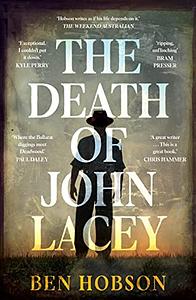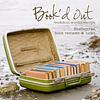Take a photo of a barcode or cover
As I was reading this novel, I was finishing the autobiography THIS MUCH IS TRUE by Miriam Margolyes in audio form and I was struck by the coincidence of some of the things that she says most powerfully and pointedly, about dehumanisation, the utter and abject cruelty of "Empire" and the way that it empowered, and continues to empower, entrenched racism. Add to that the question from Songlines: the Power and Promise, edited by Margo Neale - "What do you need to know to prosper as a people for 65,000 years?" - and you have a review of THE DEATH OF JOHN LACEY.
Nobody, for a moment, should think that this is not grim, confronting and difficult reading. This is a novel about dehumanisation, dispossession, colonisation and criminal behaviour. In the author's note at the beginning, Hobson says:
He then goes on to acknowledge that these attitudes and beliefs are in no way acceptable by contemporary standards, but they persist, maybe slightly buried by cowardice, due, in no small way, to the myths and lies that have fed the "official" narrative. I'm also acutely aware, as a descendent of a colonising family in the Ballaarat region, that these attitudes and this behaviour is part of my inheritance. Which made reading this novel just that bit more visceral, discomforting and frankly distressing. I'm thankful for writers like Hobson, and the Wadawurrung people who assisted in the writing, who make me confront the past, consider the actions of those that came before, and think long, and very hard, about the need for the truth to be told.
At the heart of this novel is the story of brothers Ernst and Joe Montague - same white father, two different race mothers, both dead when the boys were young. Side by side in everything they do, they were raised with cruelty all around them, and it shows in some of their attitudes and behaviours. John Lacey, on the other hand, is at a completely different level altogether, and the brothers, despite many years of interactions, never settle to him.
Lacey is simply greedy and cruel. He's also power hungry, and a terrible crime gives him the means to establish his own town, which he rules with an iron fist and extreme violence. Contrasted against this maniacal, evil character is the quiet and gentle Gilbert, the new preacher in town, a man who ultimately stands up against Lacey. A newcomer, he has no reason to be beholden to Lacey, and a different supporting platform to those that had survived Lacey's purges. Of considerably more interest to this reader was the platform under Ernst and Joe, whose difficult childhood and outlaw roots built within them their own moral code, a mutually supportive connection, transcending race and difference.
What this novel does particularly well is convey the goldfields as they were. The mud, misery, pain and day to day struggles of life feel very real, as does the initial forays of connection between First Nations people and colonisers. It makes sense that one on one, humanisation was there. Add authority, vested interest and sheer greed, and out rolls the dehumanisation agenda.
Whilst THE DEATH OF JOHN LACEY is violent, unflinching and confronting, it's also extremely worthwhile reading. It is well past time that the white view of colonisation and dispossession was told truthfully, and there are timely lessons to be learnt about the way that "othering" of groups of people is still used to this day.
https://www.austcrimefiction.org/review/death-john-lacey-ben-hobson
Nobody, for a moment, should think that this is not grim, confronting and difficult reading. This is a novel about dehumanisation, dispossession, colonisation and criminal behaviour. In the author's note at the beginning, Hobson says:
In the writing of this novel I have endeavoured to represent the attitudes of the early colonialists as accurately as possible, including their use of derogatory terminology and the expression of, and belief in, harmful ideas.
He then goes on to acknowledge that these attitudes and beliefs are in no way acceptable by contemporary standards, but they persist, maybe slightly buried by cowardice, due, in no small way, to the myths and lies that have fed the "official" narrative. I'm also acutely aware, as a descendent of a colonising family in the Ballaarat region, that these attitudes and this behaviour is part of my inheritance. Which made reading this novel just that bit more visceral, discomforting and frankly distressing. I'm thankful for writers like Hobson, and the Wadawurrung people who assisted in the writing, who make me confront the past, consider the actions of those that came before, and think long, and very hard, about the need for the truth to be told.
At the heart of this novel is the story of brothers Ernst and Joe Montague - same white father, two different race mothers, both dead when the boys were young. Side by side in everything they do, they were raised with cruelty all around them, and it shows in some of their attitudes and behaviours. John Lacey, on the other hand, is at a completely different level altogether, and the brothers, despite many years of interactions, never settle to him.
Lacey is simply greedy and cruel. He's also power hungry, and a terrible crime gives him the means to establish his own town, which he rules with an iron fist and extreme violence. Contrasted against this maniacal, evil character is the quiet and gentle Gilbert, the new preacher in town, a man who ultimately stands up against Lacey. A newcomer, he has no reason to be beholden to Lacey, and a different supporting platform to those that had survived Lacey's purges. Of considerably more interest to this reader was the platform under Ernst and Joe, whose difficult childhood and outlaw roots built within them their own moral code, a mutually supportive connection, transcending race and difference.
What this novel does particularly well is convey the goldfields as they were. The mud, misery, pain and day to day struggles of life feel very real, as does the initial forays of connection between First Nations people and colonisers. It makes sense that one on one, humanisation was there. Add authority, vested interest and sheer greed, and out rolls the dehumanisation agenda.
Whilst THE DEATH OF JOHN LACEY is violent, unflinching and confronting, it's also extremely worthwhile reading. It is well past time that the white view of colonisation and dispossession was told truthfully, and there are timely lessons to be learnt about the way that "othering" of groups of people is still used to this day.
https://www.austcrimefiction.org/review/death-john-lacey-ben-hobson
This is a cracking read that will appeal to fans of historical crime and western. On one level, this is a tale of colonisers reckoning with privileges extracted from black land. On another, it is about John Lacey, a man who knew exactly what was right and what was wrong and took it all anyway, no apologies, and says it up straight. Read my full review here https://jodibird.substack.com/p/the-death-of-john-lacey-ben-hobson
Reading this book was like reading about an outback renegade in the goldfields of the 1800s in Australia. A little Australia-western flair, a lot of violence and roughness, colonialism and its deep prejudice against Aboriginal people, greed and being above the law. This is a book about a fight with consciousness. And the centre of all this is John Lacey, and he is not a nice man. He lives for the power he wields in his namesake town, and is rather evil. He is the kind of man who will go to any length to achieve and hold onto a power that can rival none. Until, that is, it is challenged.
There are seven acts in this book, and we start with what seems the demise of John Lacey. We are told a story in this book. It is like an account of episodes, rather than a biography of a person or events. The style of capturing dialogue without quotation marks adds to this flow, almost a summary, but detailed enough to tell us a story from several points of view. It seems more abrupt which matched the danger and violence of the times and it took me very quickly into the 1850s and 1870s. The dust on the streets, the mud from the rain, the dirtiness and grittiness of it all.
The distorted story telling through the eyes of Joe and Ernst, as well as the Preacher Delaney, and the contrast between the Lacey townfolk in their lazy English to the properness of Delaney is quite a clever touch. Nothing is questioned, only when it suddenly seems not quite what it seems. And then everything is a fight till the bitter end. A very different look through a story set in 19th century Australia.
There are seven acts in this book, and we start with what seems the demise of John Lacey. We are told a story in this book. It is like an account of episodes, rather than a biography of a person or events. The style of capturing dialogue without quotation marks adds to this flow, almost a summary, but detailed enough to tell us a story from several points of view. It seems more abrupt which matched the danger and violence of the times and it took me very quickly into the 1850s and 1870s. The dust on the streets, the mud from the rain, the dirtiness and grittiness of it all.
The distorted story telling through the eyes of Joe and Ernst, as well as the Preacher Delaney, and the contrast between the Lacey townfolk in their lazy English to the properness of Delaney is quite a clever touch. Nothing is questioned, only when it suddenly seems not quite what it seems. And then everything is a fight till the bitter end. A very different look through a story set in 19th century Australia.
adventurous
dark
mysterious
slow-paced
adventurous
challenging
dark
emotional
mysterious
reflective
sad
tense
medium-paced
Plot or Character Driven:
A mix
Strong character development:
Yes
Loveable characters:
Complicated
Diverse cast of characters:
Yes
Flaws of characters a main focus:
Yes




